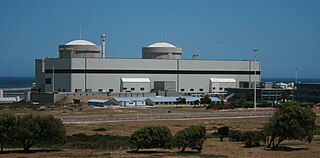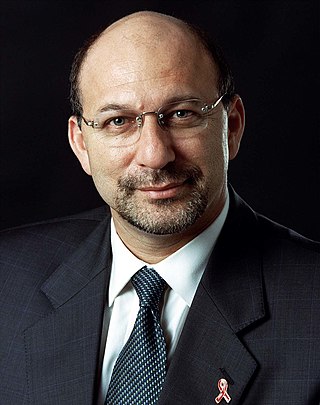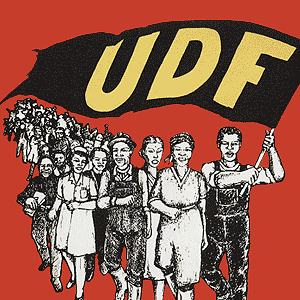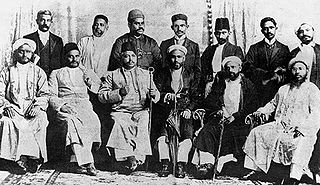Related Research Articles

Koeberg Nuclear Power Station is a nuclear power station in South Africa and the only one on the entire African continent. It is located 30 km north of Cape Town, near Melkbosstrand on the west coast of South Africa. It is owned and operated by the country's state-owned electricity public utility, Eskom.

The Defiance Campaign against Unjust Laws was presented by the African National Congress (ANC) at a conference held in Bloemfontein, South Africa in December 1951. The Campaign had roots in events leading up the conference. The demonstrations, taking place in 1952, were the first "large-scale, multi-racial political mobilization against apartheid laws under a common leadership."

Trevor Andrew Manuel is a retired South African politician and former anti-apartheid activist who served in the cabinet of South Africa between 1994 and 2014. He was the Minister of Finance from 1996 to 2009 under three successive presidents. He was also the first post-apartheid Minister of Trade and Industry from 1994 to 1996 and later the Minister in the Presidency for the National Planning Commission from 2009 to 2014. He was a member of the National Executive Committee of the African National Congress (ANC) from 1991 to 2012.

Allan Aubrey Boesak is a South African Dutch Reformed Church cleric, politician and anti-apartheid activist. He was sentenced to prison for fraud in 1999 but was subsequently granted an official pardon and reinstated as a cleric in late 2004.
The poetry of South Africa covers a broad range of themes, forms and styles. This article discusses the context that contemporary poets have come from and identifies the major poets of South Africa, their works and influence.

Earthlife Africa is a South African environmental and anti-nuclear organisation founded in August 1988, in Johannesburg. Initially conceived of as a South African version of Greenpeace, the group began by playing a radical, anti-apartheid, activist role. ELA is arguably now more of a reformist lobby or pressure group. Considered by some to be a key voice in the emerging environmental justice movement, Earthlife Africa has been criticised for being too radical, and by others for "working with traditional conservation movements" in furthering the environmental struggle.
Elias Mathope Motsoaledi OMSG was a South African anti-apartheid activist. He was Accused No.9 in the Rivonia Trial and was sentenced to life imprisonment in July 1963 with a group of anti-Apartheid revolutionaries which included Nelson Mandela who was Accused No.1.

The United Democratic Front (UDF) was a South African popular front that existed from 1983 to 1991. The UDF comprised more than 400 public organizations including trade unions, students' unions, women's and parachurch organizations. The UDF's goal was to establish a "non-racial, united South Africa in which segregation is abolished and in which society is freed from institutional and systematic racism." Its slogan was "UDF Unites, Apartheid Divides." The Front was established in 1983 to oppose the introduction of the Tricameral Parliament by the white-dominated National Party government, and dissolved in 1991 during the early stages of the transition to democracy.

The Natal Indian Congress (NIC) was a political organisation established in 1894 to fight discrimination against Indians in the Natal Colony, and later the Natal Province, of South Africa. Founded by Mahatma Gandhi, it later served an important role in opposing apartheid. It was the oldest affiliate of the South African Indian Congress.
Vuyisile Mini was a trade unionist, Umkhonto we Sizwe activist, singer and one of the first African National Congress members to be executed by apartheid South Africa.
The Koeberg Alert alliance is an anti-nuclear activist organisation which emerged from an earlier pressure group in Cape Town called "Stop Koeberg" in 1983. Both were intended to halt construction of the first nuclear power station in South Africa at Duynefontein, 28 km NNW of Cape Town: the Koeberg Nuclear Power Station.

The environmental movement in South Africa traces its history from the beginnings of conservation and preservation groups in the late 19th century, to the rise of radicalism amongst local ecologists and activists. The early environmental movement in South Africa was primarily made up of conservation groups whose membership was dominated by affluent whites. Many of these groups advocated for forms of fortress conservation that were used to justify forcibly removing Black South Africans from their land. Throughout the mid to late 20th century, justice-centered environmental groups sprung up in connection with anti-apartheid movements advocating for change on issues that affected the environment as well as the rights of workers, showing how environmental issues in the country were "inextricably linked to issues of race and politics."
The first National Conference on Environment and Development in South Africa was held at the University of the Western Cape during June/July 1991. It saw at least 231 representatives from a wide range of organisations discussing the links between environmental degradation and the political situation in Southern Africa.
Alexander Erwin is a South African politician who was Minister of Public Enterprises from 29 April 2004 to 25 September 2008.

Internal resistance to apartheid in South Africa originated from several independent sectors of South African society and took forms ranging from social movements and passive resistance to guerrilla warfare. Mass action against the ruling National Party (NP) government, coupled with South Africa's growing international isolation and economic sanctions, were instrumental in leading to negotiations to end apartheid, which began formally in 1990 and ended with South Africa's first multiracial elections under a universal franchise in 1994.

The African National Congress (ANC) has been the governing party of the Republic of South Africa since 1994. The ANC was founded on 8 January 1912 in Bloemfontein and is the oldest liberation movement in Africa.
Neville Wilson Curtis was an anti-apartheid activist and leader of the National Union of South African Students.
Martin Legassick (1940–2016) was a South African historian and Marxist activist. He died on 1 March 2016 after a battle with cancer. He was one of the central figures in the "revisionist" school of South African historiography that, drawing on Marxism, revolutionised the study of the social formation of Apartheid by highlighting the importance of political economy, class contradictions and imperialism. He was also a key figure in the independent left in South Africa from the 1970s, and a critic, from the left, of many of the analytical and strategic positions taken by the African National Congress and the South African Communist Party, as well as their understanding of South African history. The author of numerous books, mainly on the history of colonialism and capitalism, he collected many of his key political writings in his 2007 book Towards Socialist Democracy.

Archibald Mncedisi Sibeko OLS was a South African anti-apartheid activist, trade unionist and political leader.
